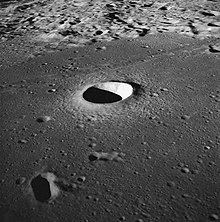Moltke (crater)
 | |
| Coordinates | 0°36′S 24°12′E / 0.6°S 24.2°ECoordinates: 0°36′S 24°12′E / 0.6°S 24.2°E |
|---|---|
| Diameter | 6.5 km |
| Depth | 1.3 km |
| Colongitude | 336° at sunrise |
| Eponym | Helmuth Graf von Moltke |

Moltke is a lunar impact crater near the southern edge of the Mare Tranquillitatis. It is a small, bowl-shaped crater surrounded by a bright halo of higher-albedo material. Just to the south lies the rille system named Rimae Hypatia. These follow a course running roughly east-southeast to west-northwest, and have a length of approximately 180 kilometers.
About 50 kilometers to the northwest of this crater is the landing site of Apollo 11.
The crater is named after German army general and author Helmuth von Moltke the Elder.[1]
Satellite craters[]
By convention these features are identified on lunar maps by placing the letter on the side of the crater midpoint that is closest to Moltke.
| Moltke | Latitude | Longitude | Diameter |
|---|---|---|---|
| A | 1.0° S | 23.2° E | 4 km |
| B | 1.0° S | 25.2° E | 5 km |
Moltke B was informally called Little Moltke by the Apollo 10 and Apollo 11 crews.
References[]
- ^ "Moltke (crater)". Gazetteer of Planetary Nomenclature. USGS Astrogeology Research Program.
- Andersson, L. E.; Whitaker, E. A. (1982). NASA Catalogue of Lunar Nomenclature. NASA RP-1097.
- Bussey, B.; Spudis, P. (2004). The Clementine Atlas of the Moon. Cambridge University Press. ISBN 978-0-521-81528-4.
- Cocks, Elijah E.; Cocks, Josiah C. (1995). Who's Who on the Moon: A Biographical Dictionary of Lunar Nomenclature. Tudor Publishers. ISBN 978-0-936389-27-1.
- McDowell, Jonathan (July 15, 2007). "Lunar Nomenclature". Jonathan's Space Report. Retrieved 2007-10-24.
- Menzel, D. H.; Minnaert, M.; Levin, B.; Dollfus, A.; Bell, B. (1971). "Report on Lunar Nomenclature by the Working Group of Commission 17 of the IAU". Space Science Reviews. 12 (2): 136–186. Bibcode:1971SSRv...12..136M. doi:10.1007/BF00171763. S2CID 122125855.
- Moore, Patrick (2001). On the Moon. Sterling Publishing Co. ISBN 978-0-304-35469-6.
- Price, Fred W. (1988). The Moon Observer's Handbook. Cambridge University Press. ISBN 978-0-521-33500-3.
- Rükl, Antonín (1990). Atlas of the Moon. Kalmbach Books. ISBN 978-0-913135-17-4.
- Webb, Rev. T. W. (1962). Celestial Objects for Common Telescopes (6th revised ed.). Dover. ISBN 978-0-486-20917-3.
- Whitaker, Ewen A. (1999). Mapping and Naming the Moon. Cambridge University Press. ISBN 978-0-521-62248-6.
- Wlasuk, Peter T. (2000). Observing the Moon. Springer. ISBN 978-1-85233-193-1.
External links[]
- Impact Melt Boundary within Moltke, from LROC
- Lunar Orbiter 3 Frame 072, very high resolution view of east rim of Moltke
- Lunar Orbiter 5 Frame 071, high resolution view of Moltke and Apollo 11 landing site
| Wikimedia Commons has media related to Moltke (crater). |
- LQ20 quadrangle
- Impact craters on the Moon
